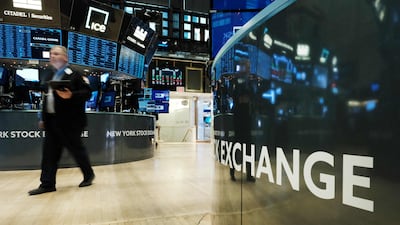Oil prices rose on Monday as China continued to ease Covid-19 curbs while Opec+ stuck to its output targets and European sanctions on Russian crude kicked in.
Brent, the benchmark for two thirds of the world’s oil, was trading 2.7 per cent higher at $87.86 a barrel at 6.43pm UAE time. West Texas Intermediate, the gauge that tracks US crude, was up nearly 3 per cent at $82.27 a barrel.
The Opec+ alliance of 23 oil-producing countries said on Sunday that it would continue with its current production cuts, but left the door open for further market interventions.
The group said it was ready to address “market developments” and support the “balance of the oil market and its stability if necessary”.
At its last meeting in October, Opec+ decided to slash its collective output by 2 million barrels per day until the end of 2023, citing concerns about a global economic slowdown.
The Opec+ move is “not a surprise, given the uncertainty in the market over the impact of the Russia crude oil import ban and the G7 price cap”, said Ann-Louise Hittle, vice president of macro oils at Wood Mackenzie.
On Friday, the G7 and Australia agreed on a $60 price cap on Russian seaborne crude oil after weeks of negotiations with Poland and other Baltic states.
The price cap aims to reduce Moscow’s oil and gas revenue while maintaining adequate supplies of crude on the global energy market, preventing a surge in crude prices after an EU embargo on Russian seaborne crude comes into effect on December 5.
Russia, which has been selling discounted barrels of crude to India and China, has said that it would not sell its oil under the G7 price cap.
“We expect the import ban to weigh moderately on Russian output in December, with a bigger impact expected when the European import ban on refined products comes into force on February 5,” said Giovanni Staunovo, a strategist at UBS.
The embargoes mean an additional 1.1 million bpd of crude and 1 million bpd of oil products currently going to EU countries will have to find new markets, according to the International Energy Agency.
UBS, which expects oil to rebound to $100 a barrel in the coming months, said markets would probably stay volatile in the near term, driven by Covid news from China and central policies in the US and Europe.
The Swiss lender maintained its “positive” oil price view for the coming quarters on expectations of lower Russian crude output, a demand rebound in China and the likely end of strategic oil reserve releases in Organisation for Economic Co-operation and Development countries.
Oil prices fell below $90 a barrel last month on concerns about China, the world’s second-largest economy and top crude importer, as it battled near-record Covid-19 cases. This triggered fears that the country would respond with extensive lockdowns.
However, the lifting of lockdowns and relaxation of strict containment measures in some major cities have supported oil demand prospects.
“The recent easing of some Covid restrictions in Shanghai may have influenced Opec+'s decision to not change policy,” said Mr Staunovo.

